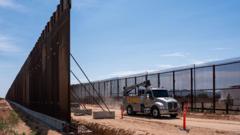The recent confrontation between South African President Cyril Ramaphosa and former U.S. President Donald Trump may pose challenges and opportunities for Ramaphosa's leadership as he navigates increasing domestic pressures within his political coalition while aiming for economic growth.
Ramaphosa's Diplomatic Struggle with Trump: Implications for South Africa's Future

Ramaphosa's Diplomatic Struggle with Trump: Implications for South Africa's Future
President Cyril Ramaphosa faces criticism and support following his contentious meeting with Donald Trump, revealing the tensions within South Africa's political landscape.
In a high-stakes meeting this week, South Africa's President Cyril Ramaphosa found himself on the receiving end of Donald Trump's controversial claims regarding South African land policies and alleged white genocide. The meeting, which broadcasted live to millions, left Ramaphosa with a dual-edged sword — facing insults from Trump, while also keeping his composure, which received commendations back home.
As Ramaphosa returns to South Africa, he confronts growing criticism towards the African National Congress (ANC), which has been struggling with a coalition government that includes ten other parties. Faced with stagnant economic conditions, high crime rates, and increased pressure from political opponents like the Economic Freedom Fighters (EFF) led by Julius Malema, Ramaphosa’s leadership is being intensely scrutinized.
Critics argue that Ramaphosa's inability to respond more aggressively to Trump's allegations falls short of public expectation during such a significant diplomatic moment. However, his measured response may potentially bolster his standing among South Africans who recognize his experience in high-pressure negotiations and his role in building alliances. According to political analysts, Ramaphosa's capacity to maintain decorum amidst Trump's diatribe could lead to a rise in his personal credibility among voters.
While navigating a difficult internal landscape, where factions within the ANC vie for influence ahead of the 2027 elections, Ramaphosa's recent encounter with Trump reminded many South Africans of his resilience and longstanding commitment to democratic processes. Analysts note that despite setbacks, he has kept the ANC afloat, indicating that his diplomatic approach may yield political dividends domestically.
Economic recovery in South Africa hinges significantly on trade agreements such as the African Growth and Opportunity Act (AGOA), which remains uncertain under the current U.S. administration. Ramaphosa’s urgency for U.S. investment to address unemployment and crime permeated discussions, highlighting the critical nature of bilateral trade relations for South Africa’s future.
With the coalition government under intense scrutiny, there exists a paradox where Ramaphosa's conduct during the Trump meeting—though contentious—could foster a sense of solidarity within the government and broaden support for the coalition. It underscores the importance of maintaining unity among diverse political voices in South Africa to face crises head-on, further emphasizing Ramaphosa's role as a mediator.
Going forward, political dynamics within South Africa may shift in response to the international spotlight cast upon these events, with implications for both the ANC and opposition factions. The fallout from Ramaphosa's meeting with Trump may revive discourse around leadership qualities and political ideologies at a time when many South Africans desire strong, decisive governance capable of addressing deep-rooted socio-economic challenges.
Ultimately, while the meeting did not achieve the desired diplomatic reset with the U.S., it may offer Ramaphosa the chance to reinforce his leadership in the context of South Africa's complex and evolving political landscape. As he navigates these challenges, the question remains: can he leverage this moment to strengthen his position and that of the ANC, or will the rising tide of opposition factions derail his progress?
As Ramaphosa returns to South Africa, he confronts growing criticism towards the African National Congress (ANC), which has been struggling with a coalition government that includes ten other parties. Faced with stagnant economic conditions, high crime rates, and increased pressure from political opponents like the Economic Freedom Fighters (EFF) led by Julius Malema, Ramaphosa’s leadership is being intensely scrutinized.
Critics argue that Ramaphosa's inability to respond more aggressively to Trump's allegations falls short of public expectation during such a significant diplomatic moment. However, his measured response may potentially bolster his standing among South Africans who recognize his experience in high-pressure negotiations and his role in building alliances. According to political analysts, Ramaphosa's capacity to maintain decorum amidst Trump's diatribe could lead to a rise in his personal credibility among voters.
While navigating a difficult internal landscape, where factions within the ANC vie for influence ahead of the 2027 elections, Ramaphosa's recent encounter with Trump reminded many South Africans of his resilience and longstanding commitment to democratic processes. Analysts note that despite setbacks, he has kept the ANC afloat, indicating that his diplomatic approach may yield political dividends domestically.
Economic recovery in South Africa hinges significantly on trade agreements such as the African Growth and Opportunity Act (AGOA), which remains uncertain under the current U.S. administration. Ramaphosa’s urgency for U.S. investment to address unemployment and crime permeated discussions, highlighting the critical nature of bilateral trade relations for South Africa’s future.
With the coalition government under intense scrutiny, there exists a paradox where Ramaphosa's conduct during the Trump meeting—though contentious—could foster a sense of solidarity within the government and broaden support for the coalition. It underscores the importance of maintaining unity among diverse political voices in South Africa to face crises head-on, further emphasizing Ramaphosa's role as a mediator.
Going forward, political dynamics within South Africa may shift in response to the international spotlight cast upon these events, with implications for both the ANC and opposition factions. The fallout from Ramaphosa's meeting with Trump may revive discourse around leadership qualities and political ideologies at a time when many South Africans desire strong, decisive governance capable of addressing deep-rooted socio-economic challenges.
Ultimately, while the meeting did not achieve the desired diplomatic reset with the U.S., it may offer Ramaphosa the chance to reinforce his leadership in the context of South Africa's complex and evolving political landscape. As he navigates these challenges, the question remains: can he leverage this moment to strengthen his position and that of the ANC, or will the rising tide of opposition factions derail his progress?



















